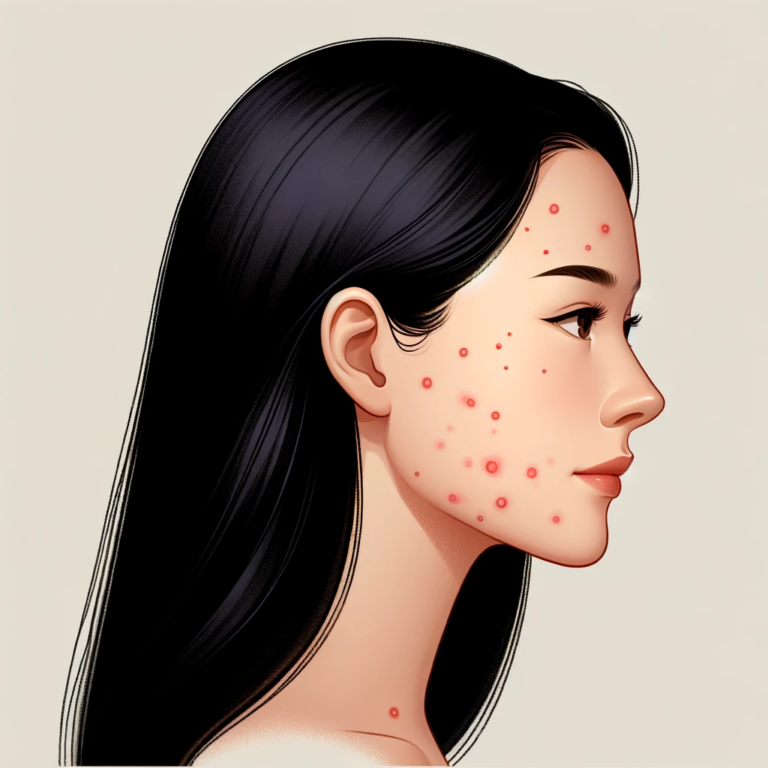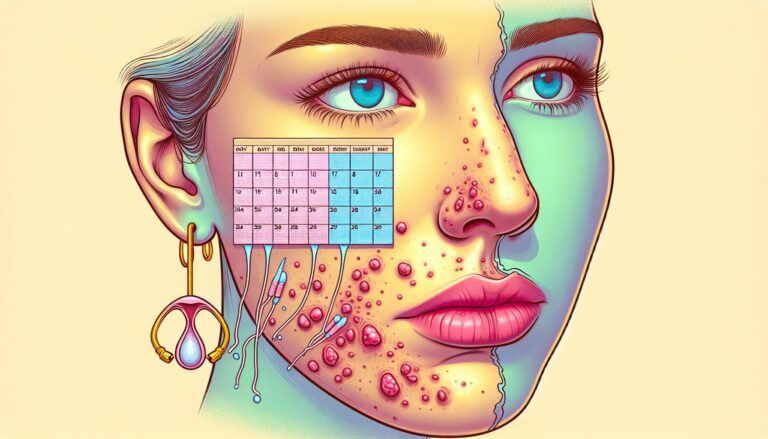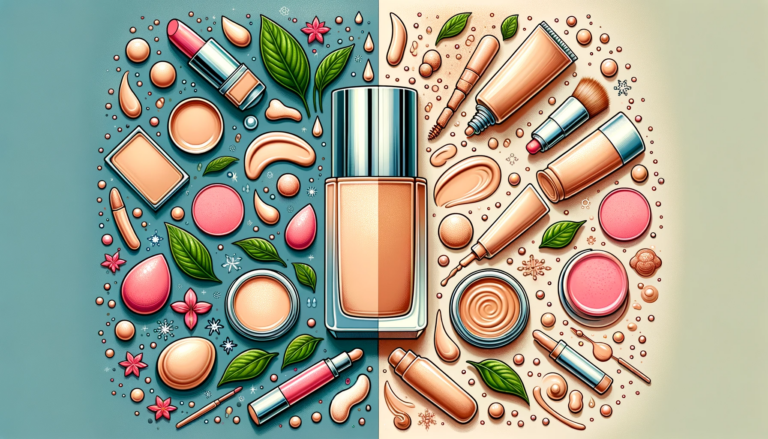Beat Chronic Inflammation Acne
Tired of battling relentless, chronic inflammation acne?
You’re in good company. This stubborn form of acne goes beyond the occasional pimple, persisting in a way that can challenge both your skin’s health and your confidence.
But understanding the deeper issues beneath your skin is the first step towards a clearer complexion. It’s about more than just surface treatments; it’s about addressing the root causes of your skin’s distress.
Well, we’ll be going over:
- What exactly is chronic inflammation acne and how does it differ from regular breakouts?
- How can your diet influence chronic inflammation acne, and what changes can help?
- What are some effective skincare and natural remedies to soothe and treat chronic inflammation acne?
Let’s dive in.

What is Chronic Inflammation Acne?
Chronic inflammation acne isn’t just your typical breakout; it’s a persistent condition that can deeply affect your skin and self-esteem. At its core, it’s characterized by prolonged redness, soreness, and pimples that seem unyielding to standard treatments.
Unlike occasional pimples that resolve with time, this form of acne stubbornly lingers, often due to underlying inflammation that’s not immediately visible on the skin’s surface.
Understanding that this condition goes beyond surface level is crucial. It signifies ongoing internal processes that exacerbate skin issues, pointing to a need for a targeted approach to treatment. With the right strategy, addressing the root causes becomes possible, opening the door to clearer, healthier skin.
Causes of Chronic Inflammation Acne
Understanding what triggers chronic inflammation acne is crucial in fighting it effectively. At its core, this condition is not just about clogged pores; it’s a sign that your body is constantly trying to fight off something.
First and foremost, hormonal imbalances play a significant role. Fluctuations in hormones, especially during puberty, pregnancy, or due to conditions like polycystic ovary syndrome (PCOS), can increase oil production, leading to more acne.
Another key factor is diet. Foods high in sugar and dairy products have been linked to acne. They can spike insulin levels and trigger inflammation throughout the body, exacerbating acne problems.
Lastly, stress isn’t just a feeling; it’s a physical trigger for acne. It causes the body to produce more cortisol, which in turn can increase oil production and inflammation, making acne worse.
Understanding these causes helps in identifying the most effective treatment strategies and lifestyle adjustments necessary to manage chronic inflammation acne effectively.
The Role of Diet in Chronic Inflammation Acne
When battling chronic inflammation acne, examining your diet is a crucial step. What you eat can significantly impact your skin’s health, potentially exacerbating or alleviating acne symptoms. Foods high in sugar and dairy products are known to trigger inflammation in some individuals, leading to more severe acne outbreaks.
Incorporating anti-inflammatory foods into your diet is essential for mitigating the effects of chronic inflammation acne. Opt for foods rich in omega-3 fatty acids, antioxidants, and vitamins such as:
- Fatty fish (salmon, mackerel)
- Leafy greens (spinach, kale)
- Berries (blueberries, strawberries)
- Nuts and seeds (flaxseed, chia seeds)
Reducing your intake of processed foods and sugars can also play a significant role in managing your acne. This doesn’t mean you have to completely overhaul your diet overnight, but gradually introducing healthier options can make a difference in your skin’s appearance and overall inflammation levels.
By being mindful of your diet, you’re taking a step towards controlling your chronic inflammation acne more effectively.
Skincare Routine for Chronic Inflammation Acne
When battling chronic inflammation acne, your skincare routine plays a critical role in managing your symptoms. A gentle, yet effective regimen can help soothe inflammation, reduce breakouts, and promote healing. Here’s how to tailor your skincare routine to fight chronic inflammation acne effectively.
First, choose a mild cleanser that’s free of harsh chemicals and fragrances. Look for products containing salicylic acid or benzoyl peroxide, as these can help unclog pores without over-drying your skin. Cleansing twice daily is key to removing impurities and excess oil that can contribute to acne.
Next, integrate a lightweight, non-comedogenic moisturizer into your routine. Even if your skin feels oily, hydration is essential to maintain its natural barrier. This step can help prevent irritation and support skin health.
Incorporating a topical treatment that targets inflammation is also crucial. Ingredients like niacinamide and green tea extract are known for their anti-inflammatory properties and can be beneficial in reducing redness and swelling associated with acne.
Remember to always apply sunscreen during the day. Sun exposure can exacerbate acne and lead to post-inflammatory hyperpigmentation. Opt for mineral-based sunscreens designed for sensitive skin to avoid irritation.
Natural Remedies for Chronic Inflammation Acne
When battling chronic inflammation acne, incorporating natural remedies into your skincare routine can offer gentle yet effective alternatives to harsh chemicals.
Tea tree oil, with its powerful antibacterial properties, can reduce pimple size and redness when applied topically in a diluted form. It’s crucial to use a carrier oil to avoid skin irritation.
Aloe vera is another hero in the fight against stubborn acne. Known for its soothing and anti-inflammatory abilities, aloe vera gel applied directly to the skin can help calm flare-ups and promote healing without clogging pores.
Diet plays a pivotal role in managing inflammation. Foods rich in omega-3 fatty acids, like salmon and chia seeds, can reduce inflammation levels in your body, potentially easing acne symptoms.
Simultaneously, incorporating antioxidants through berries and dark leafy greens can support skin health from the inside out.
Remember, while natural remedies can be incredibly beneficial, it’s paramount to patch test any new product or ingredient on your skin before full application. Keeping consistent and patient is key as these natural solutions may take time to show their full effects.
Conclusion
Tackling chronic inflammation acne requires a holistic approach. By understanding that it’s not just a surface-level problem but one that stems from underlying inflammation, you’re already a step ahead.
Adjusting your diet to include anti-inflammatory foods while cutting back on sugar and dairy can make a significant difference. Remember, incorporating a skincare routine designed for your unique needs, including gentle cleansing and targeted treatments, is key.
Don’t overlook the power of natural remedies like tea tree oil and aloe vera for a softer approach. Above all, patience and consistency in your regimen are vital. With these strategies, achieving clearer, healthier skin is within your reach.






